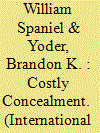| Srl | Item |
| 1 |
ID:
188388


|
|
|
|
|
| Summary/Abstract |
This article presents a formal model that shows how states can credibly reassure each other simply by maintaining a cooperative outward narrative. The reassurance literature to date has focused largely on costly signaling, whereby benign states must distinguish themselves by taking specific actions that hostile types would not. The mere lack of overtly expressed hostility without costly signals has been considered “cheap talk,” on the assumption that this behavior is costless for hostile states and thus uninformative. In contrast, this paper argues that maintaining a cooperative façade while secretly formulating and executing exploitative policies carries inherent trade-offs, and thus constitutes a credible reassurance signal. Foreign policy planning and implementation requires communication among various individuals, groups, and organizations, which has some probability of being observed and punished by outside actors. Yet efforts to conceal the policymaking process and reduce this probability are costly—they require investments in internal monitoring and restrictions on internal communication that can substantially degrade policy outcomes. Thus, to the extent that a state's foreign policymaking process is transparent—that is, that concealing internal communications is difficult—the absence of positive signals of hostility is a credible signal of its benign intentions. The argument is illustrated with a case study of German reassurance signals during the July Crisis preceding World War I.
|
|
|
|
|
|
|
|
|
|
|
|
|
|
|
|
| 2 |
ID:
158682


|
|
|
|
|
| Summary/Abstract |
Many international organizations reduce the costs states incur from conflict. Critics argue that the expectation of such aid, by mitigating potential suffering, perversely incentivizes states to initiate conflict more often. I develop a model that formalizes this intuition. It shows that institutions may still ameliorate suffering in two ways. First, they may absorb so many of the expected costs that they compensate for the fact that conflicts occur more often. Second, aid can have a second-order effect of reducing uncertainty about the costs of conflict; to the extent that this uncertainty explains why parties cannot negotiate a cooperative alternative, aid might actually reduce the incentive to initiate conflict. Whether aid ultimately helps or hurts therefore depends on how it interacts with the informational challenges states face.
|
|
|
|
|
|
|
|
|
|
|
|
|
|
|
|